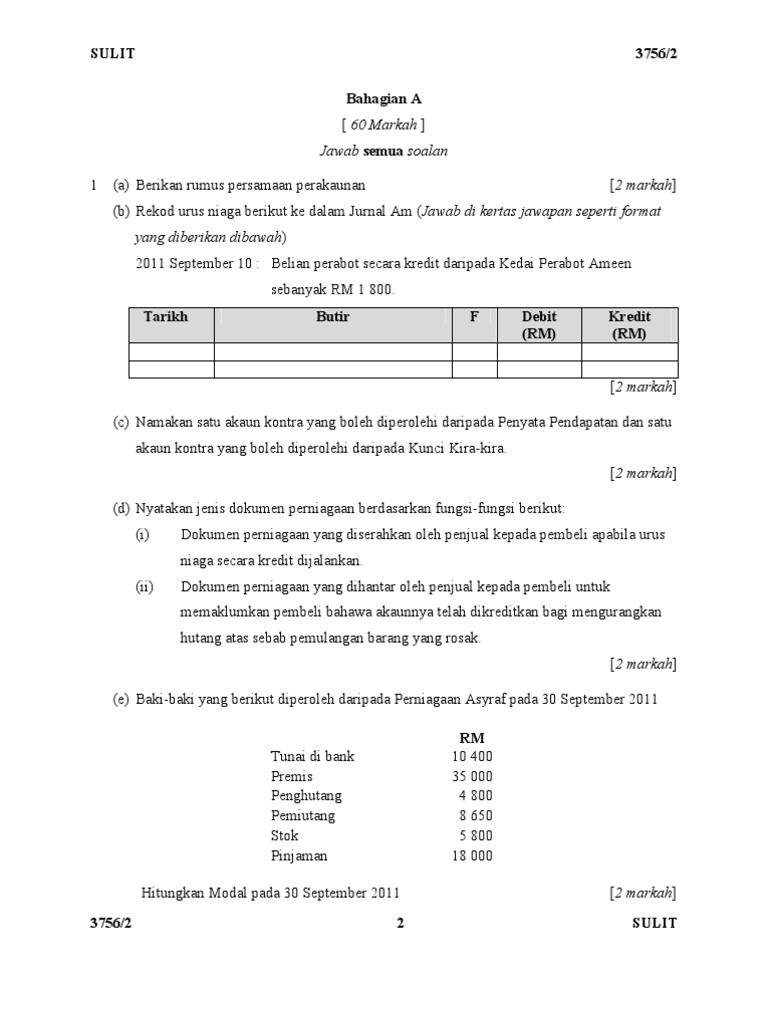Jawapan Buku Pelangi Akaun Tingkatan 4
Are you looking for a comprehensive guide for the Jawapan Buku Pelangi Akaun Tingkatan 4? Look no further, because in this article, we will provide an in-depth analysis of the principles of accounting that are covered in this textbook. Whether you're a student or an educator, this guide will help you understand the subject matter on a deeper level.

Image Source: Scribd
Introduction to Accounting Principles
Before delving into the specifics of the Jawapan Buku Pelangi Akaun Tingkatan 4, it's essential to understand the fundamentals of accounting principles. Accounting principles are essentially a set of guidelines and rules that companies follow when recording financial transactions.
There are several accounting principles, and they include:
- The cost principle
- The revenue recognition principle
- The matching principle
- The materiality principle
- The consistency principle
- The conservatism principle
The Cost Principle
The cost principle states that assets should be recorded at the original cost paid for them. This means that the initial purchase price of an item determines the value of the item on the financial balance sheet. This is important because some assets may appreciate or depreciate over time, but they should always be recorded at their original cost.
The Revenue Recognition Principle
The revenue recognition principle is a fundamental accounting concept that states that revenue should only be recorded once the product or service has been delivered to the customer. This means that companies should not record revenue until the goods or services have been delivered and the customer is satisfied with the purchase.
The Matching Principle
The matching principle is an accounting principle that requires companies to match their expenses with the revenues they generate. This means that when a company incurs a cost, it should be matched with the revenue generated from that expense in the same period. This ensures that the financial statements accurately reflect the financial performance of the company.
The Materiality Principle
The materiality principle means that transactions and events that are significant enough to influence the decisions of financial statement users should be recorded and disclosed in the financial statements. This principle allows companies to focus on significant transactions and events, rather than minor ones, to ensure that financial statements are accurate and meaningful.
The Consistency Principle
The consistency principle requires companies to use the same accounting principles and methods for similar transactions over time. This ensures that financial statements can be compared over various periods quickly and accurately.
The Conservatism Principle
The conservatism principle is an accounting principle that requires companies to recognize expenses and losses as soon as possible, but to only recognize revenue and gains when they are certain. This principle allows companies to take a conservative approach to financial reporting, potentially understating financial performance to avoid misleading financial statements.
Jawapan Buku Pelangi Akaun Tingkatan 4 Principles
Now that we understand the fundamental accounting principles let's look at how they apply to the Jawapan Buku Pelangi Akaun Tingkatan 4. This book covers several accounting topics, including:
- Introduction to accounting
- Control accounts and subsidiary ledgers
- Bank reconciliation statements
- Double-entry concepts and rules
- Preparation of basic financial statements
- Inventory valuation methods
- Depreciation and disposal of fixed assets
These topics cover a broad range of accounting principles, including inventory valuation, depreciation, and the preparation of financial statements. By studying these principles, students can develop a deep understanding of the basics of accounting.
The Importance of Understanding Accounting Principles
Accounting is a fundamental aspect of any business, and understanding accounting principles is essential for anyone involved with financial operations. Whether you're a student studying accounting or an entrepreneur managing a business, having a solid understanding of accounting principles can help you make informed decisions about financial management.
By using the Jawapan Buku Pelangi Akaun Tingkatan 4 as a guide, you can develop a solid foundation in accounting principles. With this knowledge, you can apply accounting principles to real-world scenarios and make informed decisions that support your financial goals.
Conclusion
Accounting principles are essential for understanding financial operations, and the Jawapan Buku Pelangi Akaun Tingkatan 4 covers a wide range of accounting principles, including inventory valuation, depreciation, and the preparation of financial statements. By studying these principles, you can develop a deep understanding of the basics of accounting and use this knowledge to make informed decisions about financial management.





